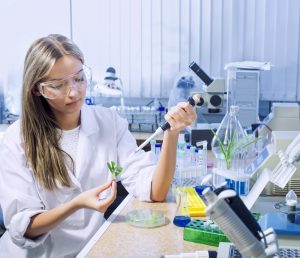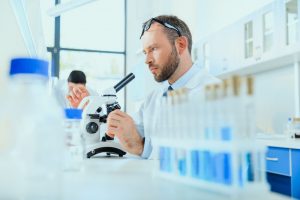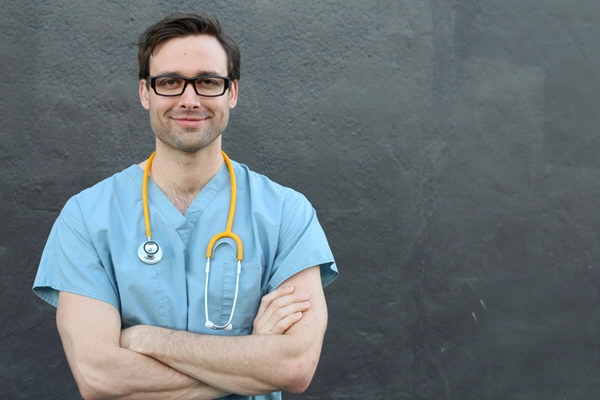 The title of this article sounds pretty bizarre, but it is true, nonetheless.
The title of this article sounds pretty bizarre, but it is true, nonetheless.
Researchers have figured out how to grow testosterone-producing cells in the laboratory that could be used in testosterone replacement therapy (TRT) to treat low testosterone, or hypogonadism, with personalized replacement cells.
It’s pretty wild to think about, and here are the details of this breakthrough research and development.
The research was published in Proceedings from the National Academy of Sciences and focused on turning stem cells into fully functioning Leydig cells. In men, these cells within the testes manufacture testosterone, a sex hormone.
Why Men Need Testosterone Replacement Therapy
 Across America and the world, millions of men experience low testosterone, especially as men age.
Across America and the world, millions of men experience low testosterone, especially as men age.
It’s a fact of life. Some men are more impacted than others, experiencing mood shifts, infertility, poor libido and sexual function (erectile dysfunction), weight gain and/or poor bone density…or even all this at once!
Yikes! Due to the high demand, TRT is a multi-billion-dollar industry with treatment centers across the country. All men age, and all men will experience some sort of low testosterone in their lifetime.
Testosterone production can even be impacted by getting sick, such as with mumps, or by having cancer treatment during the adolescent years.
Thankfully, TRT is a simple fix most of the time, especially since, these days, there are multiple options available: injections, capsules, gels/creams, sprays, and pellets. Lead researcher Vassilios Papadopoulos says, “You feel better, you lose weight, the erectile function returns. Men love testosterone.”
 New Method Could Bypass Side Effects
New Method Could Bypass Side Effects
Unfortunately, TRT has some side effects, just like with most drugs and hormone treatments.
These include infertility and possibly the increased risk of prostate cancer and heart issues.
However, this is hotly debated, and studies are conflicting. In addition, with the gels/creams, the hormone can rub off on people in close contact with the patient, such as significant others or children.
This can have dire consequences if it happens consistently, especially for children. The researchers believe that a transplant of lab-grown testosterone-producing cells injected into the patient would significantly reduce the side effects and have no chance of cross-contamination.
Scientists who previously tried to cultivate Leydig cells from stem cells failed because their cells produced cortisol and not the desired testosterone.
Other times, stem cells from bone marrow or umbilical cords were used and do not multiply that well in the laboratory, according to Papadopoulos. His team used human-induced pluripotent stem cells from skin or blood, which can develop into any type of cell needed or wanted by scientists.
 Papadopoulos added his secret ingredient of collagen to the mix, and lo and behold; the cells started producing testosterone.
Papadopoulos added his secret ingredient of collagen to the mix, and lo and behold; the cells started producing testosterone.
Plus, the Leydig cells looked precisely the same as a naturally occurring ones in the male reproductive tract.
Papadopoulos says that “the human collagen was the secret sauce.” He thinks that human transplantation of these cells is a few years away, but the next step is transplanting them into animal subjects with hypogonadism. Stay tuned for those updates!
And rest assured, the updates will be coming, fast and furious. The breakthroughs and developments in the longevity field are increasing at a blistering pace.
Between nanotechnology, stem cells, genetic editing, 3-D printing, artificial intelligence, hormone replacement therapy, and pharmaceutical discoveries, the possibility of an extended AND healthy life span is increasing by leaps and bounds.
The future is indeed bright...for those who can stay around long enough to experience these mind-boggling advancements. And that's where we come up.
Contact us for a FREE, no-obligation discussion concerning the incredible benefits of Hormone Replacement Therapy (HRT) and many other life-extending technologies.
Reference
Contact Us Today For A Free Consultation

- Question: What Makes Men Sexy to Women? Answer: Low Stress, High Testosterone, Strong Immunity - Testosterone Therapy [Last Updated On: June 17th, 2024] [Originally Added On: February 29th, 2020]
- Low Testosterone Levels Cause Health Woes -- Testosterone Prescription [Last Updated On: May 14th, 2024] [Originally Added On: March 11th, 2020]
- Co-Sleeping with Baby Drops Men’s Testosterone Levels [Last Updated On: June 6th, 2024] [Originally Added On: March 21st, 2020]
- A Great Way to Boost Your Testosterone? Get Married! [Last Updated On: December 17th, 2023] [Originally Added On: April 1st, 2020]
- Five Myths About Low Testosterone And Testosterone Therapy — Testosterone Prescription [Last Updated On: April 29th, 2024] [Originally Added On: April 8th, 2020]
- Testosterone Reduces Group Think, Cooperation, and Less Sheep-Like Mentality [Last Updated On: August 8th, 2024] [Originally Added On: April 25th, 2020]
- Testosterone, Viagra not a winning combination for erectile dysfunction - Testosterone Prescription [Last Updated On: November 25th, 2024] [Originally Added On: April 30th, 2020]
- A Disturbing Trend: Testosterone Levels Falling Even Lower in Adolescent Males [Last Updated On: August 17th, 2024] [Originally Added On: May 31st, 2020]
- Low-T: Men With Low Testosterone Found More Likely to Die From COVID-19 AKA Coronavirus [Last Updated On: August 21st, 2024] [Originally Added On: June 12th, 2020]
- The Effects of Hypogonadism on Men and How to Fix It: Testosterone Replacement Therapy [Last Updated On: January 17th, 2024] [Originally Added On: June 14th, 2020]
- Testosterone Drives Ego, Reduces Cooperation — Testosterone Prescription [Last Updated On: February 29th, 2024] [Originally Added On: November 2nd, 2020]
- Testosterone Linked to Heart Disease -- Testosterone Prescription [Last Updated On: April 13th, 2024] [Originally Added On: November 18th, 2020]
- Acidosis: The Hidden Health Destroyer [Last Updated On: July 4th, 2024] [Originally Added On: January 20th, 2021]
- Testosterone Therapy Could Lower Diabetes Risk for Men – The Science is Promising! [Last Updated On: September 7th, 2024] [Originally Added On: February 19th, 2021]
- Who Would Have Thought? The Moon’s Cycles Affect Men’s Hormones Too! [Last Updated On: January 13th, 2024] [Originally Added On: April 23rd, 2021]
- Testosterone replacement therapy improves symptoms of metabolic syndrome - Testosterone Prescription [Last Updated On: November 24th, 2024] [Originally Added On: April 24th, 2021]
- The top ten testosterone booster supplements: A review [Last Updated On: November 12th, 2024] [Originally Added On: April 27th, 2021]
- Increase in testosterone drug use - Testosterone Prescription [Last Updated On: November 16th, 2024] [Originally Added On: April 29th, 2021]
- Men with higher testosterone tend to lie less, study suggests [Last Updated On: May 8th, 2024] [Originally Added On: April 30th, 2021]
- Environment trumps genes in testosterone levels, study finds - Testosterone Prescription [Last Updated On: November 13th, 2024] [Originally Added On: May 2nd, 2021]
- Testosterone shown to help sexually frustrated women- Testosterone Prescription [Last Updated On: November 18th, 2024] [Originally Added On: May 3rd, 2021]
- Testosterone therapy — good idea or not? - Testosterone Prescription [Last Updated On: November 24th, 2024] [Originally Added On: May 5th, 2021]
- With testosterone, it's 'my way or the highway': UK study - Testosterone Prescription [Last Updated On: November 17th, 2024] [Originally Added On: May 9th, 2021]
- Too much testosterone makes for bad decisions, tests show - Testosterone Prescription [Last Updated On: November 25th, 2024] [Originally Added On: May 10th, 2021]
- Your Life on Testosterone: Overly Sure, Unwilling to Listen to Anyone [Last Updated On: February 4th, 2024] [Originally Added On: October 17th, 2021]
- Study Investigates the Effects of Democratic Outcomes on Testosterone Levels [Last Updated On: July 26th, 2024] [Originally Added On: March 30th, 2022]
- Frustrating Factors That Suppress Testosterone Levels [Last Updated On: July 31st, 2024] [Originally Added On: July 10th, 2022]
- Testosterone and Human Behavior: Hormone Promotes Prosocial Behaviors [Last Updated On: October 4th, 2024] [Originally Added On: August 15th, 2022]
- Guide to Boosting Your Testosterone Levels Naturally [Last Updated On: October 10th, 2024] [Originally Added On: August 16th, 2022]
- The Testosterone Controversy: To Take or not to Take? [Last Updated On: October 20th, 2024] [Originally Added On: November 8th, 2022]
- Think Testosterone is for Men Only? THINK AGAIN! [Last Updated On: October 14th, 2024] [Originally Added On: November 16th, 2022]
- Testosterone Recruits Immune Cells That Fight Cancer [Last Updated On: September 4th, 2024] [Originally Added On: November 22nd, 2022]
- Kevin Nash Defends The Rock’s PED Use after Joe Rogan’s Comments [Last Updated On: November 1st, 2024] [Originally Added On: December 15th, 2022]
Word Count: 622





















